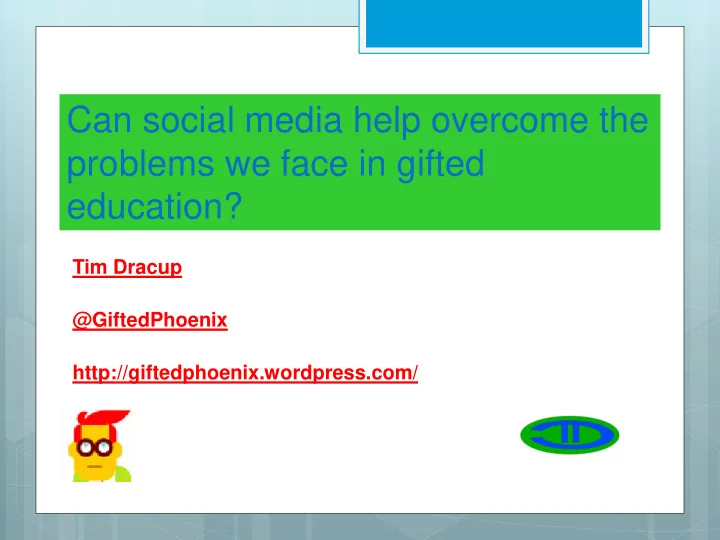

Can social media help overcome the problems we face in gifted education? Tim Dracup @GiftedPhoenix http://giftedphoenix.wordpress.com/
Hypothesis Social media offers our best chance to ‘only connect’ Link socially and geographically dispersed individuals, organisations and stakeholder groups for mutual benefit Overcome fragmentation, insularity and disagreement Increase influence and strengthen collaboration Prepare for imminent globalised gifted education
5 Dimensions of Gifted Education Advocacy Learning Policy-making Professional development Research
Dimensions of social media Social media (Web 2.0) support online interaction through publishing, curating, sharing, discussing, creating content Social learning networks apply 2 related concepts - social network + networked learning - to online communities [ organised ] Personal learning networks (PLNs) – people one connects with for learning [ informal ] Vast array of tools and platforms
Globalisation Integration and interaction regardless of distance and boundaries – impact of transport and (online) communication Interdependence of economic markets Development of ‘knowledge economies’ Some countries invest in gifted education to supply highly- skilled labour Education market Increasingly globalised so… Gifted education is on the cusp of globalised delivery
Social network use in the EU (2011) 35% of adults use social networks once or more weekly (56% in Netherlands), but 44% never use them 56% of 18-24 year-olds use social networks daily or almost daily 77% of 13-16 year-olds (92% in Norway) and 38% of 9-12 year-olds (70% in Netherlands) have a social networking profile 5% of 18-74 year-olds take an online course (14% in Finland) 10% of students take an online course (50% in Finland)
Advocacy ‘Support advocacy’ depends on networks; ‘Lobbying advocacy’ hasn’t been too successful Some engagement on Facebook and Twitter, much valued by participants, but limited impact on opinion formers Peripheral to communications strategies of international gifted organisations; some defensiveness Need significant increase in usage to achieve critical mass; more openness and transparency That would open up organised lobbying possibilities
Learning Excellent fit with the personalised learning on which gifted learners depend; Capacity to bring gifted learners together, co-ordinate complex learning packages, support accelerative elements and peer-to-peer learning Some specialist providers active; other non-specialist options available – no big players targeting gifted Develop searchable database of learning options with Amazon-style QA Extend to crowdsourced ‘learning pathways’ linking stand - alone online materials Build learning communities and accreditation around these
Policy-making Hasn’t emerged as a focus within international organisations; little evidence of networking between policy makers Consequent risk of ‘policy tourism’ and wheel reinvention Little specialist activity on social media (but wider education policy interests more active) Establish online Gifted Education Observatory stocking information, data, research Support parallel online collaboration, including development of international quality standards
Professional development Limited focus in countries where gifted a low priority; face-to-face delivery costly and inefficient Bottom-up delivery models need access to best practice, not just known practice Few packages developed with reference to what already exists elsewhere Increasing significance of social media activity as PLN concept gains ground Build online modules around proposed Observatory; use same methodology proposed for learners
Research Inaccessible and/or costly to access; inconsistent quality Limited networking across research community, especially support for young researchers; traditional conferences inefficient Existing social media research platforms are poorly used, especially by ‘names’ Develop online network linked to Observatory; form an international online think-tank Open up conferences via social media; part of a continuum, with events linked by social networking Open access to research
Obstacles and issues Funding, if moving beyond free tools and platforms Rapid pace of change; hard to keep everything linked together Not everyone has access to hardware or broadband Online safety, especially for younger gifted learners Resistance in some quarters; often predicated on perception of social media as time-consuming optional bolt-on - rather than integral and key.
Action Build European Talent Support Network on social media principles – by that means ensure distributed responsibility rather than a Budapest-driven model Form multinational working group to develop Europe- wide social media strategy for gifted education Bid for funding via EU Lifelong Learning Programme to support this process If you aren’t active on social media, sign up and explore Lurk if you must, but remember that ‘you get out what you put in’ If you are already active, maintain and extend your gifted education PLN
THANK YOU! This presentation summarises a more substantial two-part post on my Gifted Phoenix Blog: • Part One • Part Two
Recommend
More recommend